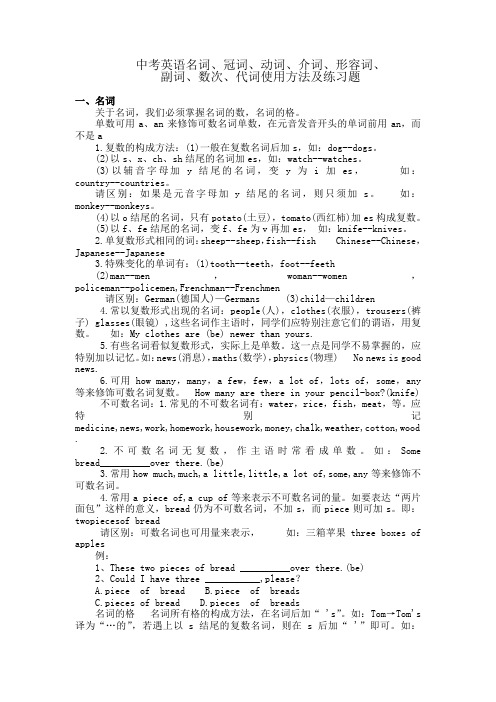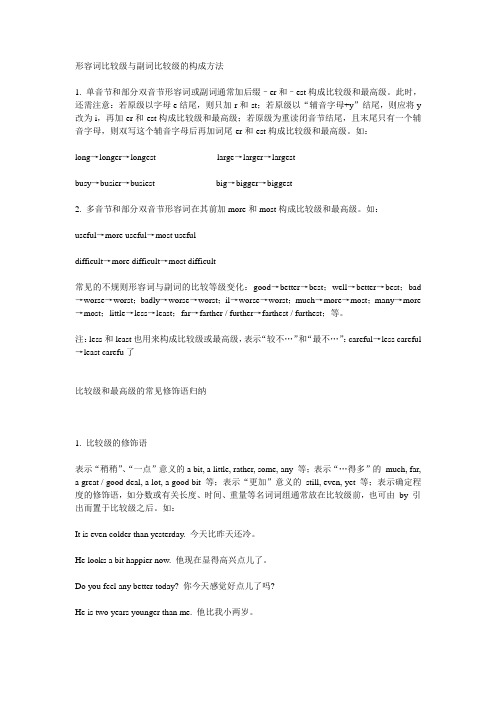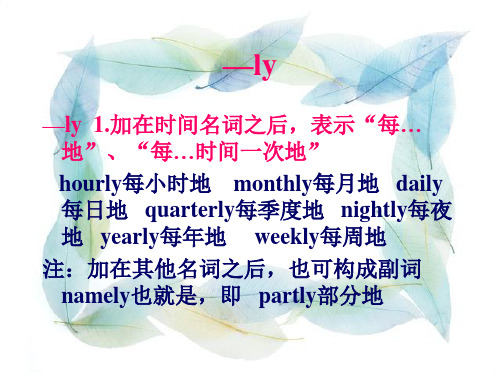副词构成法
副词的用法

副词的用法一、副词及其基本用法副词主要用来修饰动词,形容词,副词或其他结构。
副词的句法功能1、用作状语Look at the photo carefully. 仔细看看这张照片。
You’re driving too fast. 你开车开得太快了。
2、用作表语The meeting is over. 会议结束了。
Is anyone upstairs? 楼上有人吗?Is the radio on or off? 收音机是开着的还是关着的?【注】在通常情况下,用作表语时不用副词而用形容词。
如可说The woman is beautiful. 而不说The woman is beautifully.可说The cloth feels soft. 不能说The cloth feels softly.英语中用作表语的副词主要是表地点的副词以及某些与介词同形的副词,而且只能用于连系动词be 英语中用作表语的副词主要是表地点的副词以及某些与介词同形的副词,而且只能用于连系动词后作表语,而不用于其他连系动词后作表语,如可说He is here 或He is abroad,但不能说He seems here 或He seems abroad。
3、用作宾语It’s hot in here. 这里面很热。
It’s not far from here. 从这儿去不远。
I’ll stay at home tonight. 今晚我将呆在家里。
【注】副词用作宾语的用法十分有限,通常只用作介词宾语,并且只限于某些表示时间和地点的副词,而且不同的副词有不同的搭配特点,如here和there 可与along, around, down, from, in, near, round, up 等介词连用,但通常不与介词to连用,如不说come to here, go to there 等(注:from here to there是例外),而表地点的副词abroad 则只与介词from连用,不与其他介词连用。
中考英语名词、冠词、介词、形容词、副词、数词、代词使用方法及练习题

中考英语名词、冠词、动词、介词、形容词、副词、数次、代词使用方法及练习题一、名词关于名词,我们必须掌握名词的数,名词的格。
单数可用a、an来修饰可数名词单数,在元音发音开头的单词前用an,而不是a1.复数的构成方法:(1)一般在复数名词后加s,如:dog--dogs。
(2)以s、x、ch、sh结尾的名词加es,如:watch--watches。
(3)以辅音字母加y结尾的名词,变y为i加es,如:country--countries。
请区别:如果是元音字母加y结尾的名词,则只须加s。
如:monkey--monkeys。
(4)以o结尾的名词,只有potato(土豆),tomato(西红柿)加es构成复数。
(5)以f、fe结尾的名词,变f、fe为v再加es,如:knife--knives。
2.单复数形式相同的词:sheep--sheep,fish--fish Chinese--Chinese,Japanese--Japanese3.特殊变化的单词有:(1)tooth--teeth,foot--feeth(2)man--men,woman--women,policeman--policemen,Frenchman--Frenchmen请区别:German(德国人)—Germans (3)child—children4.常以复数形式出现的名词:people(人),clothes(衣服),trousers(裤子) glasses(眼镜) ,这些名词作主语时,同学们应特别注意它们的谓语,用复数。
如:My clothes are (be) newer than yours.5.有些名词看似复数形式,实际上是单数。
这一点是同学不易掌握的,应特别加以记忆。
如:news(消息),maths(数学),physics(物理) No news is goodnews.6.可用how many,many,a few,few,a lot of,lots of,some,any等来修饰可数名词复数。
副词的用法

副词副词的构成:1.在形容词后直接+ly,如:careful-carefully;quick-quickly;slow - slowly ; sad - sadly2.辅音字母+y结尾的形容词,把y改为i再+ly,如:happy-happily;angry-angrily3.以le结尾的形容词,去掉e再+y,如:simple-simply;terrible-terribly4. 以e结尾的形容词,直接加-ly;fortunate - fortunately polite- politely5. 有些词既可以做形容词也可以做副词如:late,early,hard,fast,far,high6. good的副词是well7. 注意:hardly(几乎不)与hard的区别;friendly是形容词其的副词是friendlily8. 有些词虽是以- ly 结尾但不是副词而是形容词:friendly 友好的lovely 可爱的likely 可能的lonely 孤独的deadly 致命的weekly 每周的lively 有生气的写出下列形容词相应的副词1. careful2.quiet3.bad4.slow5.true6.terrible7.heavy 8.angry 9.good10.fast te 12.early副词的基本用法:区别:形容词(adj.) 修饰名词或代词。
These are the world’s only invisible fish. 通常放在所修饰的名词前Everything is quiet 通常放在系动词(be,感官动词, 变得…)复合不定代词后感官动词(feel , smell, taste, look, hear\sound )复合不定代词: 由some any, every,no等构成如nothing special副词(adv.) 修饰动词,形容词,副词或整个句子。
His fish tanks sell very quickly. 通常放在所修饰的动词后They are completely satisfied. 通常放在所修饰的形容词,副词前Luckily, he won the competition. 修饰整个句子,放在句首用正确形式填空1.This cake smells _________ and sells _________. (good)2.He works very ________.He __________has a rest on Sundays.(hard)3.We must listen to our teacher _____________.(careful)4.Will you please drive _______? The plan is taking off.(fast)5.The old lady shouted ___________ at the boys who broke her windows.(angry)用所给形容词的原级、比较级或最高级填空1.Peter studies ___________. Jane studies ___________than peter. Tom studies_________.(well)2.Lucy runs as ___________ as Kate.(fast)3.Michael cuts __________ than I .Tim cuts ___________ of the three.(slow)4.She played the piano much __________ than you. I played __________among the five.(wonderful)5.John comes ___________than Jim.Jim comes ____________in his class.(late)6.I speak very __________.Jim speaks __________than I. Lucy speaks ________of all.(loudly)拓展生活是一个五味瓶,包含甜酸苦辣,作为学生的你,一定有很多想法。
英语语法——副词

副词连用顺序:程度副词+方式副词+地点副词+时间副词。
副词 fùcí[adverb] 起修饰或限制动词或形容词作用、表程度或范围的词。
编辑本段分类1) 时间和频度副词:now,then,often,always,usually,early,today, late, next,lastday,already,generally,frequently,seldom,ever,never,yet,soon,too, immediately, finally,shortly, before, ago,sometimes, yesterday. once,twice2) 地点副词:here, there, everywhere, anywhere, in, out, inside, outside, above, below, down, back, forward, home, upstairs, downstairs, across, along, round , around, near, off, past, up, away, on.3) 方式副词:carefully, properly, anxiously, suddenly, normally, fast, well, calmly, politely, proudly, softly, warmly4) 程度副词:much,little, very,rather,so,too,still, quite, perfectly, enough, extremely, entirely,almost, slightly, hardly.5) 疑问副词:how, when, where, why.6) 关系副词:when, where, why.7) 连接副词:therefore,moreover,however,otherwise,then. 编辑本段用法副词在句中可作状语,表语,补语,定语。
形容词比较级与副词比较级的构成方法

形容词比较级与副词比较级的构成方法1. 单音节和部分双音节形容词或副词通常加后缀–er和–est构成比较级和最高级。
此时,还需注意:若原级以字母e结尾,则只加-r和-st;若原级以“辅音字母+y”结尾,则应将y 改为i,再加-er和-est构成比较级和最高级;若原级为重读闭音节结尾,且末尾只有一个辅音字母,则双写这个辅音字母后再加词尾-er和-est构成比较级和最高级。
如:long→longer→longest large→larger→largestbusy→busier→busiest big→bigger→biggest2. 多音节和部分双音节形容词在其前加more和most构成比较级和最高级。
如:useful→more useful→most usefuldifficult→more difficult→most difficult常见的不规则形容词与副词的比较等级变化:good→better→best;well→better→best;bad →worse→worst;badly→worse→worst;il→worse→worst;much→more→most;many→more →most;little→less→least;far→farther / further→farthest / furthest;等。
注:less和least也用来构成比较级或最高级,表示“较不…”和“最不…”:careful→less careful →least carefu了比较级和最高级的常见修饰语归纳1. 比较级的修饰语表示“稍稍”、“一点”意义的a bit, a little, rather, some, any 等;表示“…得多”的much, far, a great / good deal, a lot, a good bit 等;表示“更加”意义的still, even, yet 等;表示确定程度的修饰语,如分数或有关长度、时间、重量等名词词组通常放在比较级前,也可由by 引出而置于比较级之后。
副词变化规律

副词变化规律
副词是形容词或其他副词的修饰语,在句子中用来修饰其他词语,表示程度、范围、时间、方式等。
根据副词的词性特点和在句中的作用,副词的变化规律可以归纳如下:
1. 双音节以"-ly"结尾的副词
这是英语中最常见的一类副词形式。
例如:
- 形容词: careful
副词: carefully
- 形容词: happy
副词: happily
2. 以"well"结尾的形容词变为副词时,通常无需改变
- 形容词: well
副词: well
3. 一些不规则形式副词
- 形容词: good
副词: well
- 形容词: bad
副词: badly
4. 有些双音节形容词的副词形式要改变发音
- 形容词: polite
副词: politely (重读在第二个音节)
5. 有些副词由相关的名词或动词派生而来
- 名词: luck
副词: luckily
- 动词: migrate
副词: migratorily
6. 一些副词是固定的词语不可分解
- maybe, seldom, ever, never等
大多数副词是由形容词加上"-ly"构成的。
同时也有一些例外和不规则形式需要注意。
了解副词的构词规律有助于更好地理解和运用副词。
形容词、副词比较级和最高级的构成及用法

格式: much+ 副词比较级+than
例句: Can Kim run faster than Jim? Sue goes to the movies much more than I do. Today the water in the river is flowing slower than
yesterday. Today Amy arrived at the school earlier than me.
5.无比较级的形容词
right wrong perfect excellent
有些词本身含有比较含义,也没有比较级:
senior(年长的) junior(年小的) major(主要的) minor(次要的)
提示:避免双重比较
cheaper more cheaper
better more better
Lee is a better student than me.=Lee is a better student than I am. I'm healthier than her.=I'm healthier than she is.
格式: the+形容词最高级
例句: Which girl is the tallest,Liz,Jane or Jill? Mr.Wood is the friendliest person in our neighborhood. Lisa is the fastest swimmer on our swimming team. She is the most hardworking student I've ever known.
单音节的形容词+er/est
副词构词法

pairwise成双成对地
—ly
—ly 1.加在时间名词之后,表示“每… 地”、“每…时间一次地” hourly每小时地 monthly每月地 daily 每日地 quarterly每季度地 nightly每夜 地 yearly每年地 weekly每周地
注:加在其他名词之后,也可构成副词 namely也就是的兼作形容词后缀 1.常与—ways通用,表示方向,方式,状
态 crosswise交叉地(的) coastwise沿海岸 cornerwise对角地,斜 lengthwise纵长 地 endwise末端朝前地 sidewise斜向一边 地(的)
2.也有不与—ways通用者 clockwise顺时针方向 likewise同样地 sunwise顺日转方向 otherwise要不然, 否则
2.加在形容词之后,构成副词,表示状态、 程度、方式、“…地”
truly真正地,确实地 badly恶劣地 greatly大大地 quickly迅速地 fearfully 可怕地 quietly安静地 newly新近,最 近 gloriously光荣地 carefully仔细地 fortunately 幸运地
—ward
—ward 形容词及副词的后缀 表示“向…的”、“向…”、“朝…”
downward向下(的) sunward向阳(的) upward向上(的) backward向后(的) northward向北(的) outward向外(的) inward向内(的) seaward向海(的) homeward向家(的)
- 1、下载文档前请自行甄别文档内容的完整性,平台不提供额外的编辑、内容补充、找答案等附加服务。
- 2、"仅部分预览"的文档,不可在线预览部分如存在完整性等问题,可反馈申请退款(可完整预览的文档不适用该条件!)。
- 3、如文档侵犯您的权益,请联系客服反馈,我们会尽快为您处理(人工客服工作时间:9:00-18:30)。
副词构成法
1.有些副词为简单副词(不带词尾):
often,out,quite,soon,home,back,there,thus,seldom,ever
2.有些副词,特别是地点副词及时间副词,常常以加词尾的方式构成:
-ly(=every):yearly,monthly,daily,fortnightly
-ward(s)(=toward):backward(s),leftward(s),upward(s),homeward(s),eastward (s),onward(s),inward(s)
-wise,-ways:lengthwise,clockwise,likewise,otherwise;always,lengthways,sideways-long:headlong-ling(s):sideling(s)
-s:upstairs,outdoors,sometimes,nowadays,needs或在一些单音节词前加词头或其他简单字:
a-:along,away,abroad,apart,aside,adraft,aloud,ashore,across,above
be-:before,below,beneath,besides
介词:inside,overboard,uphill,beforehand,today
there-:therein(=in that),thereafter,thereby,thereof,therewith,ect.(陈旧用法)
here-:herein(=in this),hereafter,hereby,hereof,herewith,etc.(陈旧用法)
where-:wherein(=in what or which),whereon,whereby,whereof,wherewith,ect.(陈旧用法)
3.绝大多数副词都由形容词以下述3种方式构成:
a.大多数方式副词,都在形容词后加-ly构成。
注意拼法:
形容词副词形容词副词
glad gladly mournful mournfully
happy happily heavy heavily
jolly jollily silly sillily
shy shyly dry dryly
due duly true truly
able ably probable probably
dull dully full fully
vile vilely sole solely
despotic despotically idiomatic idiomatically
public publicly(例外情况)
ill-natured ill-naturedly kind-hearted kind-heartedly
provoking provokingly charming charmingly
faltering falteringly lingering lingeringly (书面语)
mistaken mistakenly hidden hiddenly
marked markedly undisguised undisguisedly (书面语)
但是:friendly(形容词)—in a friendly way;manly(形容词)—in a manly manner;kingly (形容词)—in akingly manner.
和形容词一样,以-ingly或-edly结尾的副词,也有激起感情及感受情绪的差别,但用得比较少,如:
激起情绪感受情绪
He speaks amusingly We listen amusedly.
The flowers bloom delightfully.We watch them de-ligtedly
He behaves disgustingly.We left disgustedly.
The fight goes on excitingly.We look on excitedly.
b.有少数副词和形容词形式相同:
He came in the late afternoon.(形容词)
He arrived late.(副词)
He has waited for a long time.(形容词)
He has waited so long.(副词)
另一些与形容词同形的副词有:
early,fast,far,near,well,ill,high,low,much,lit-tle,only,enough,hard,straight,right,wrong,left,east,west
在口语中有些形容词直接用作副词:
It is mighty good.
I am dead tired.
The soup is precious hot.
He is terrible rude.
c.有些单音节形容词有两个副词形式,一个带-ly,一个不带,意思不相同:
We must buy cheap(=at a low price).We got offcheaply(=easily).
He lives high(=luxuriously).He spoke highly(=well)of me.
He came near.He nearly(=almost)died.
He played foul.He was foully murdered.
I love Mary most.They are mostly crazy.
4.有少数副词与指示代词同形:
He has some(=about)fifty pounds.
It something(=somewhat)astonished me.
I care nothing(=not at all)for your threat.
Can you wait any(=in any way)more?I can't wait anymore.
I slept none(=never).I passed the night none too com-fortably.Is it that(=so)easy?
He is all(=entirely)alone.。
